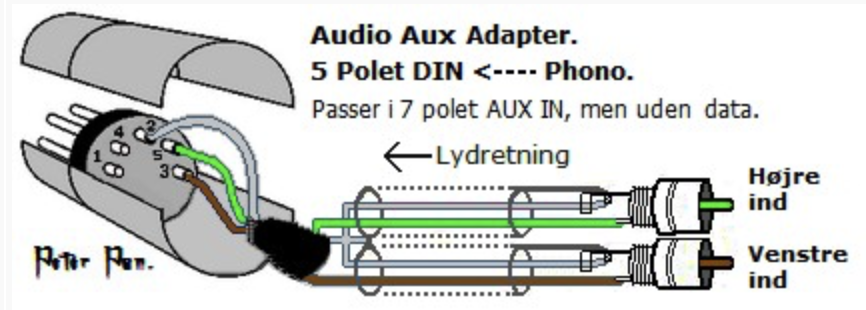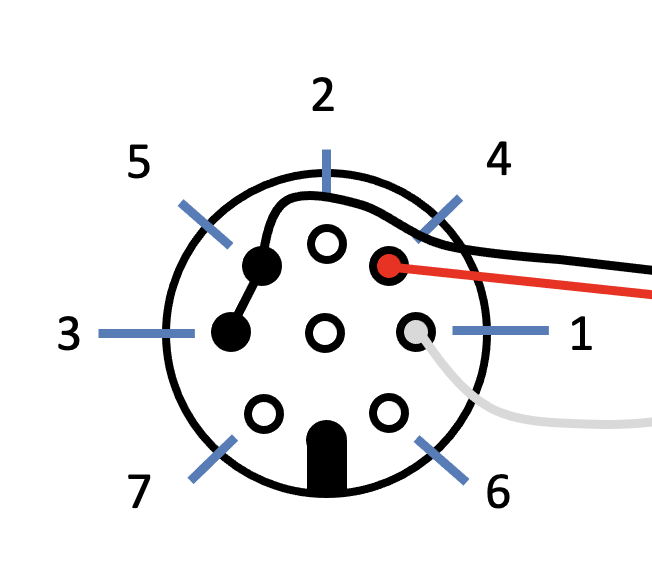Home › Forums › Product Discussion & Questions › BeoLab › BeoLab 3500: how to use the DIN connector as AUX IN
- This topic has 22 replies, 4 voices, and was last updated 2 years, 1 month ago by

-
AuthorPosts
-
3 January 2024 at 01:00 #51814
 BRONZE Member
BRONZE MemberI have a BeoLab 3500 with serial 17xx xxxx, type 1601.
I would like to use the DIN connection as an AUX Input. I have tried the following PIN connections (for the pin-numbers I refer to the Peter Pan picture below, so seen from the solder side of a male plug that goes into the BeoLab 3500):
- 2 = GND, 3 and 5 for Left and Right channel IN.
- 2 = GN D, 2 and 4 for Left and Right channel IN.
For selecting the DIN in the BeoLab menu I used:
- ‘Menu > Menu > 0 > 4 > Go’. This shows ‘MCL SEL’ in the display, but only gave a lot of HUM no sound coming through.
- ‘Menu > Menu > 0 > 3 > Go’. This shows ‘ML ON’ in the display, a slight hum, no sound coming through.
My questions
- What is the right Menu operation to activate the DIN connector for AUX IN use?
- What is the right DIN-pin use to get the audio signal in?
Location: The Netherlands
Favourite Product: BeoSound 9000
My B&O Icons:
3 January 2024 at 14:30 #51815Madskp
GOLD MemberYou have an MK1 which has a different pinout. Have a look at little down in this thread that has the pinout for both the MK1 and MK2
https://www.hifi4all.dk/forum/forum_posts.asp?TID=32157&PN=1&TPN=30
Menu, 0, 4, go is the right operation. Note that when this mode is activated any remote command or button command on the BL3500 will make it go to standby
Hope this helps
Also you might take a look in my thread about these connections on the BL3500
https://forum.beoworld.org/forums/topic/bl3500-and-the-mcl-pl-connector/
Location: Denmark
3 January 2024 at 18:08 #51816 BRONZE Member
BRONZE MemberThnx Madskp!
You were right. I made a new Mini-Jack to DIN cable with the pin configuration for MK1 and it worked, when connecting a battery run iPod to the BeoLab.
Then I connected a streamer box via the same Mini-Jack to DIN cable, and that caused Hum on the left channel.
Any idea what to do about that?
Location: The Netherlands
Favourite Product: BeoSound 9000
My B&O Icons:
3 January 2024 at 18:25 #51817Madskp
GOLD MemberDo you run 2 separate ground wires from the minijack to the Din connector? Then maybe that could be the issue.
On my testing cables I have connected pin 3, 5 and 7 (ground for MCL data) with a solder blob and just running one common ground
Location: Denmark
3 January 2024 at 19:27 #51818 BRONZE Member
BRONZE MemberThe cable just has 1 GND wire. The PIN connections I have now look like this:
- 1 = Left (grey line)
- 2 = Right (red line)
- 5-3 = GND (black line)
Question
- So, do you mean I should also connect pin 7 with 3 and 5?
- And that it should solve the Hum I am having now?
Location: The Netherlands
Favourite Product: BeoSound 9000
My B&O Icons:
3 January 2024 at 20:01 #51819Madskp
GOLD Memberyou could try to connect to pin 7 also. When the BL3500 is used in an MCL system all three are connected via the cabeling. Also pin 7 is the only one with direct connection to ground in the speaker
Location: Denmark
6 January 2024 at 12:38 #51820 BRONZE Member
BRONZE MemberThnx Madskp.
I have ordered a 7-Pin DIN plug, to include pin-7 in the grounding.
Will come back with feedback when I have received and tested this.Location: The Netherlands
Favourite Product: BeoSound 9000
My B&O Icons:
6 January 2024 at 13:07 #51821Madskp
GOLD MemberThnx Madskp.
I have ordered a 7-Pin DIN plug, to include pin-7 in the grounding.
Will come back with feedback when I have received and tested this.Hope that will solve it, and please report back. If that works I will make an updated pinout diagram for this
Location: Denmark
9 January 2024 at 12:36 #51822 BRONZE Member
BRONZE MemberHere’s an update.
Today I received the 7-pin DIN plug, so I have just soldered a new cable based on your advice. The pin connections now look like this:
Result:
- Unfortunately there is no change, I still have the Hum on the Left channel.
In this case an iPod is connection via the Mini-Jack > DIN cable.
- When the iPod is powered by an USB wall plug, the Hum is there.
- When the iPod is powered by its internal;l battery, the Hum is not there.
Question:
What other pin connections can I try to solve the Hum?
Location: The Netherlands
Favourite Product: BeoSound 9000
My B&O Icons:
9 January 2024 at 14:58 #51823Are speaker and iPod charger in same power outlet ?
Try that !
Try different charger. In my case I reduced ‘hum’ by changing charger to an iPad charger.
9 January 2024 at 15:03 #51824Madskp
GOLD MemberAlso one other easy thing to try: Try to rotate the figure 8 power plug in the Beolab 3500 180 degrees.
Location: Denmark
9 January 2024 at 15:40 #51825 BRONZE Member
BRONZE MemberWhen speaker and iPod are in the same wall outlet, there is still a Hum.
By rotating 180 degrees, do you mean:
- Pin 1 (Left signal In) becomes Pin 3
- Pin 4 (Right signal In) becomes Pin 7
- Pin 5 + 3 + 7 connected become Pin 4 + 1 + 6 connected
Let me know! 😉
About BeoLab 3500 MK1
In the meantime I learned that BeoLab 3500 til serial number 19343452, are MK1. All serial numbers from 19343452 and up are MK2. So mine (ser. 1787 xxxx) is a MK1 (like you mentioned before Madskp).
Also I read on the archived forum (post by Keith Saunders) that the Service Manuals for the BeoLab 3500 MK1 and LCS9000 are the same. In the service manual of the LCS9000 the Pin layout of the DIN connector is shown like this:
This is the way I created a Mini-Jack to DIN cable before for a LCS9000. And it worked.
Using the same cable for the 3500 MK1 gives a hum.Question
- Any ideas?
Location: The Netherlands
Favourite Product: BeoSound 9000
My B&O Icons:
9 January 2024 at 15:57 #51826Madskp
GOLD MemberIt is the 230V power plug I suggest you rotate 180 degree, not the DIN plug pins
Location: Denmark
9 January 2024 at 18:26 #51827Madskp
GOLD MemberAbout BeoLab 3500 MK1 In the meantime I learned that BeoLab 3500 til serial number 19343452, are MK1. All serial numbers from 19343452 and up are MK2. So mine (ser. 1787 xxxx) is a MK1 (like you mentioned before Madskp). Also I read on the archived forum (post by Keith Saunders) that the Service Manuals for the BeoLab 3500 MK1 and LCS9000 are the same. In the service manual of the LCS9000 the Pin layout of the DIN connector is shown like this: This is the way I created a Mini-Jack to DIN cable before for a LCS9000. And it worked. Using the same cable for the 3500 MK1 gives a hum.
Btw I am no really sure where you are going with this as your wirering seems to be as it should according to the specifications in the servicemanual for the LC9000/BL3500 MK1
I will see if I can replicate the hum on my BL3500 MK1 and repport back with my findings.
Location: Denmark
10 January 2024 at 11:35 #51828 BRONZE Member
BRONZE MemberThnx Madskp!
I have just tested with rotating the power plug 180 degrees. This is the outcome:
- Rotating the power plug of the audio source device/iPod & keeping the power plug of BeoLab 3500 same = no difference.
- Rotating the power plug of the BeoLab 3500 & keeping the power plug of the audio source device/iPod same = a bit less Hum than before, but still on an annoying level.
I hope you can try to replicate/test at your side. Please let me know your findings.
Location: The Netherlands
Favourite Product: BeoSound 9000
My B&O Icons:
10 January 2024 at 16:50 #51829Could the quality of the minijack / cable be the root cause ?
Is it an old cable you have re-used ?
Could it be a special cable where ground/left/right isn’t as you expect ?
Have you tried various other chargers for the iPod ?
11 January 2024 at 12:42 #51830 BRONZE Member
BRONZE MemberUpdate / new findings
Yesterday and today, I did some extra testing. Using different audio sources, like the iPod. But now also different Power plugs.At some point I noticed a huge difference in Hum when I connected the iPod and powered it with different USB wall outlet plugs. One of them gave almost no Hum, while another one gave a huge Hum.
My conclusion
- The (wrong) USB wall outlet plug, was the cause for creating Hum.
- Replacing it with a different (better/less distortion) USB wall outlet plug, keeps the Hum under control.
- If anyone has the same problem, search for a USB wall outlet plug that has a low distortion to the audio signal.
My question
Since I am looking for NO distortion/Hum; who can recommend a USB wall outlet plug that creates NO/minimal distortion/Hum?Location: The Netherlands
Favourite Product: BeoSound 9000
My B&O Icons:
11 January 2024 at 12:58 #51831Madskp
GOLD MemberI have just tried to make a test with my BL3500 MK1.
I could not find my adapter cable I have made for it at first so I started by making a minijack to 7 pin DIN cable where I connected pin 3 and 5 in the DIN plug to ground on the minijack, and and pin 1 and 4 in the DIN plug to L and R in the minijack.
Connected to my Macbook pro connected to power I was getting a noticeable hum when nothing was playing. When I removed the power cord from the Macbook the hum disappered.
Later I found the adapter which is a 8 Pin male DIN plug in the speaker end. Pin 3, 5 and 7 is soldered together and is connected to the screen in the cable (original B&O AUX cable used for this) and connected to PIN 2 in a 7 Pin female DIN connector in the other end of the adapter.
Pin 1 and 4 from the 8 Pin male DIN is connected to pin 3 and 5 in the 7 Pin female DIN connector in the other end of the adapter.
Also I have pin 6 (data) connected between the two DIN plugs.
When I use this adapter with a normal minijack to 5 Pin DIN cable I get no hum (that I can hear). Why this makes a difference I can’t tell.
So this hum issue could both be because of power sources and signal cables or a combination of these.
Location: Denmark
11 January 2024 at 12:58 #51832Hi,
As you can see in this thread my BeoLab’s are connected to preout of a surround receiver and triggered via a USB power source.
https://archivedforum2.beoworld.org/forums/t/45510.aspx
I were facing ‘humming’ in some speakers as well.
Way more in the BL4000 with class AB amps than in the class D IcePower Beolabs (BL7.2 and BL2).
It is the same USB power supply triggering them all.
I managed to reduce the ‘humming’ significantly by using an iPhone charger model A1400 5V 1Amp. I previously wrote iPad charger. That was wrong.
I think you have to accept some ‘humming’ from an old class AB amp. It is normal.
But Apple iPhone A1400 would be my recommendation.
11 January 2024 at 16:39 #51833 BRONZE Member
BRONZE Member@Ravsted: thanks for sharing. I have ordered an original Apple A1400 charger, and will also test here if it works better.
@Madskp: thanks for checking with your own BeoLab 3500.
I am not sure if I understand what you have done with your cabling.
- Did you use a B&O original 8-pin cable, and connected that to your DIN to Mini-Jack cable?
- I think the big difference with the B&O original cable is that the B&O cable has a shield, besides the GND for the Left and the Right channel. And that this shielding is connected to pin 3, 5 & 7 on the male connector. Do you agree?
- Do you think that I could use a DIN to Mini-Jack cable that could do the same, if it has separate leads for Left, Right, Ground Left, Ground Right and shielding?
Location: The Netherlands
Favourite Product: BeoSound 9000
My B&O Icons:
-
AuthorPosts
- You must be logged in to reply to this topic.
















